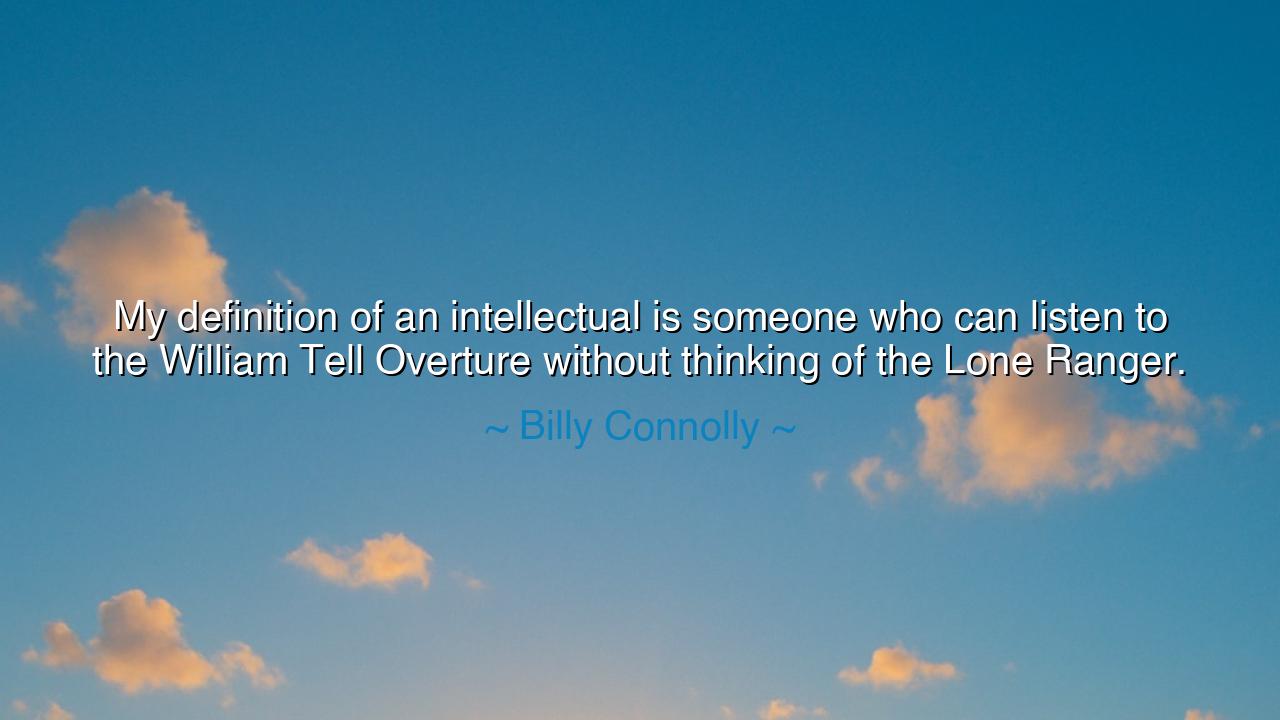
My definition of an intellectual is someone who can listen to the
My definition of an intellectual is someone who can listen to the William Tell Overture without thinking of the Lone Ranger.






In the grand tapestry of human endeavor, there are those who perceive the world not just through their senses but through the lens of deeper understanding and reflection. Billy Connolly, in his witty observation, presents a definition of an intellectual: "My definition of an intellectual is someone who can listen to the William Tell Overture without thinking of the Lone Ranger." At first glance, this may seem a humorous and playful remark, but within it lies a profound lesson about the nature of thought and awareness. Connolly’s words are not simply a jest; they challenge us to rise above the surface of things and see beyond the associations that shape our perceptions.
The William Tell Overture, composed by Rossini, is a musical masterpiece, rich with history and complexity. It stands as a beacon of culture, evoking thoughts of classical music, of European tradition, and of artistic achievement. Yet, to the untrained ear, to one who has not ventured beyond the obvious, it may bring to mind the image of a cowboy hero racing across the screen, as it was famously used in the introduction of the Lone Ranger television show. This is where the intellectual must rise above, where awareness and depth of thought must guide us to see the world not as it has been shaped by popular culture, but as it exists in its broader, richer context.
Consider, if you will, the great minds of the past—those such as Socrates or Aristotle—who, while surrounded by the most basic of material concerns, chose instead to see the world through the lens of truth, reason, and understanding. They, too, faced the distractions of their time—whether the petty politics of Athens or the fleeting fame of those who pursued wealth over wisdom. Yet, they saw beyond these things, honing their ability to recognize and pursue the higher truths that lay hidden beneath the surface of everyday life. The intellectual, like these ancient sages, does not settle for the immediate or the obvious; they seek the deeper meaning of things, the broader context in which they exist.
In our own age, this ability to see beyond the surface has become increasingly rare. In a world of constant distraction, where media and popular culture flood our senses, it is easy to fall into the trap of associating things with their immediate context. Just as the Lone Ranger invades the mind when the William Tell Overture plays, so too do our minds become filled with shallow, fleeting thoughts when we are not careful. The intellectual, however, is the one who can break free from these associations. They are the ones who, upon hearing the overture, are transported not to the world of television shows but to the world of classical music, to the rich history of Rossini’s composition, and to the lessons embedded within the piece itself.
Let us recall the story of Leonardo da Vinci, whose mind was constantly attuned to deeper insights. He did not merely look at the world and accept it as it appeared; he sought to understand its underlying mechanisms and principles. The simple act of observing nature, for Leonardo, was not just a matter of appreciating its beauty but of unlocking its secrets. He did not allow the distractions of his time—whether the politics of the Renaissance or the fleeting fashions of his era—to cloud his vision. In the same way, an intellectual today must seek to understand the world in its deepest form, rejecting the surface-level associations that cloud our vision.
The wisdom of Connolly’s quote lies in its challenge to us: can we hear the William Tell Overture and separate it from the images of cowboys and television shows? Can we hear it, not as a symbol of pop culture, but as a work of classical genius? This challenge is not just about music but about how we engage with the world itself. Are we, like many, bound by the associations that culture has planted in our minds? Or are we willing to rise above them and see the world with clarity, to look beyond the noise and seek the truth beneath the surface?
The lesson here is one of awareness and discipline. We must strive to hear the world as it truly is, not as we are taught to hear it. Whether it is music, art, history, or the simple experiences of our daily lives, we must seek to understand the deeper meanings, to see beyond the superficial, and to engage with the world as it truly exists. Just as the intellectual must listen to the William Tell Overture without thinking of the Lone Ranger, so too must we live our lives not by the distractions of popular culture, but by the wisdom that lies beneath the surface of all things.






AAdministratorAdministrator
Welcome, honored guests. Please leave a comment, we will respond soon